Is Taiwan really shooting for a net-zero economy?
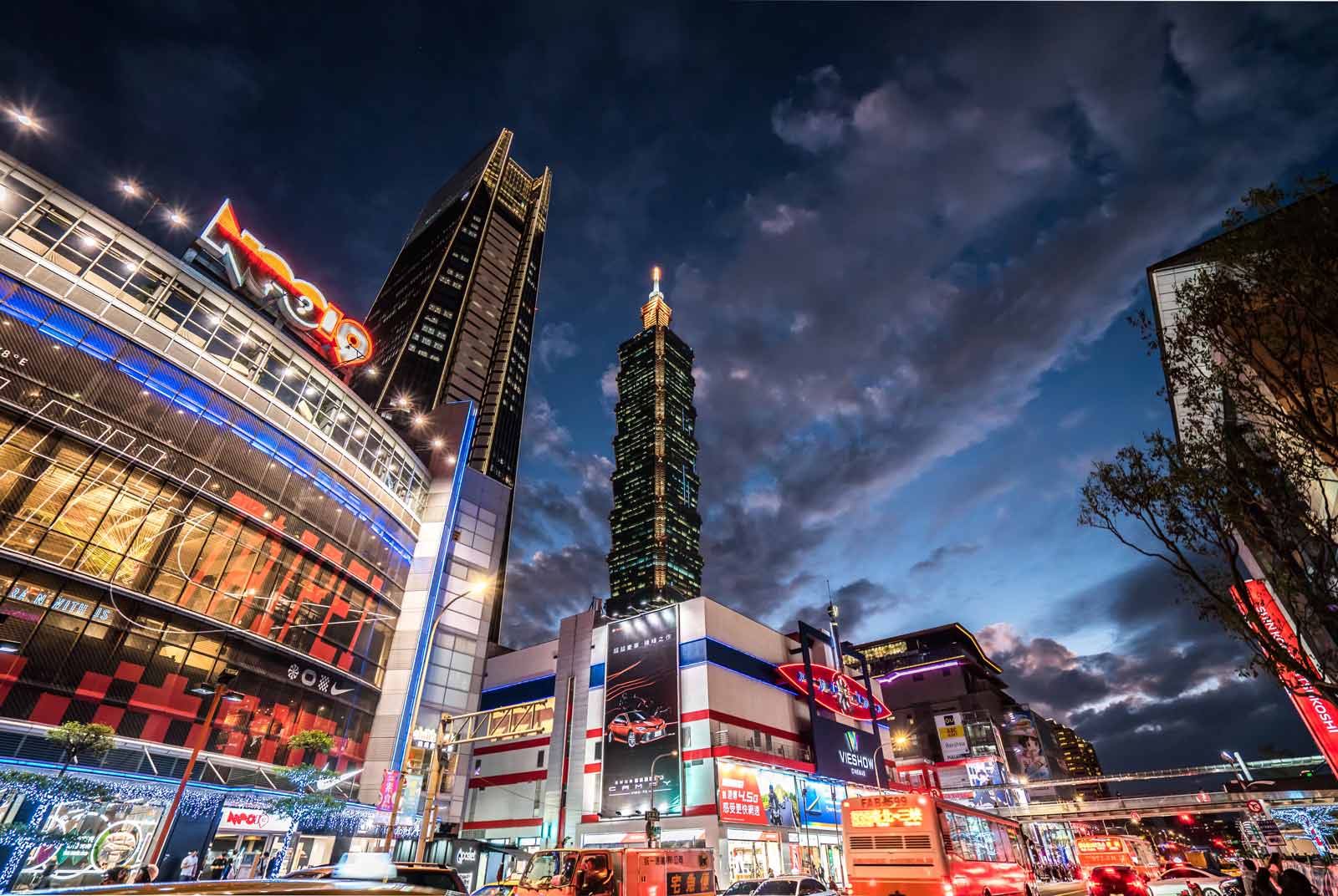
Source:shutterstock
Despite Taiwan's pledge for a net-zero economy by 2050. However, its efforts as low renewable energy (8.3%), prioritize natural gas over sustainability. In this op-ed, Philippe Tzou shares his views on Belgium and Brussels, which have made substantial progress in renewables, EVs, cycling, and waste reduction. What can Taiwan learn from these countries?
Views
Is Taiwan really shooting for a net-zero economy?
By Philippe Tzouweb only
In the midst of this record-breaking summer heat, a peculiar exhibition called the “Sustainable Development Goals Asia Exhibition” took place in Taipei late July, displaying yet another greenwashing bash by Taiwan’s largest public and private institutions in this election year.
And while the Taipei World Trade Center was blasting coal-fueled air-conditioned air out onto the Xinyi Boulevard sidewalks, most of islanders here ignore that due to climate change, another island Republic of Tuvalu – only about 7000 kilometers south in the Pacific Ocean and an ally of Taiwan –, is counting its years before permanent inundation and… total disappearance from the surface of the earth.
Taiwan declared in April 2022 that its entire economy aims at achieving net zero emission by 2050. Yet according to the Climate Change Performance Index in 2023, Taiwan (or Chinese Taipei) is ranked 57th and “remains in the bottom 10 among the 59 countries and the European union that collectively account for 92% of global greenhouse gas emission”. Let’s see if we can spot some inconsistencies between the 2050 political goal and the actual state of play in fighting climate change in Taiwan.
Taiwan has currently only a meager 8.3 % of its electricity coming from renewable energy as of 2022 and given all the conundrum with the current state of development of offshore-wind energy and solar energy plants, things are not likely to improve quickly. Instead, priorities have been given to speed up the building of natural gas plants, as Commonwealth Magazine reported in June.
Out of the 44,000 automobiles sold in Taiwan during the first quarter or 2023, only 3,216, or 7.3%, were electric cars, despite all the domestic electronics and automotive industries’ hype about manufacturing EVs for the world. As reported by CommonWealth Magazine recently, everyday there are 720,000 people commuting into Taipei City, and if matched with Taipei City Government’s recent survey, 32.8 % of daily Taipei commuters use their scooters, and 16.5% of them use their private cars: this means that everyday almost half of all the commuters into the city use scooters and cars.
Taiwan may boast to be the world’s top manufacturer of bicycles, it is pretty evident that its cities have a very low ratio of cycling commuters given the low priority of city governments to actively promote urban cycling as a means of transportation. (Cycling can apparently only be categorized as a leisure but never a commuting option).
If we look at Taipei City’s lower carbon emission plan (see picture), none of the following measures are mentioned: decreasing dependency on carbon-intensive electricity, decreasing fossil-fuel vehicles circulation, increasing use of bicycle commuting.
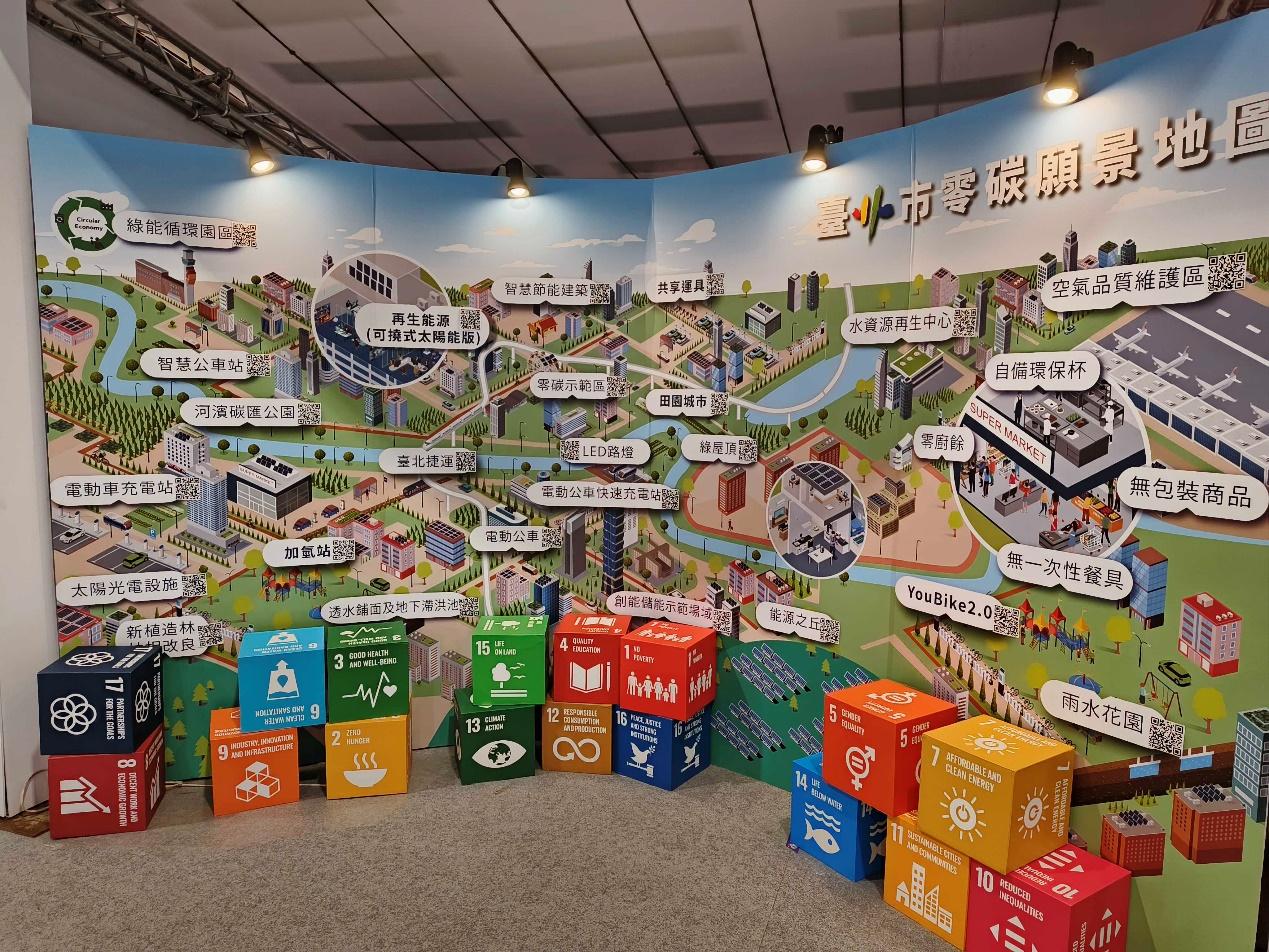 (Credit: Philippe Tzou)
(Credit: Philippe Tzou)
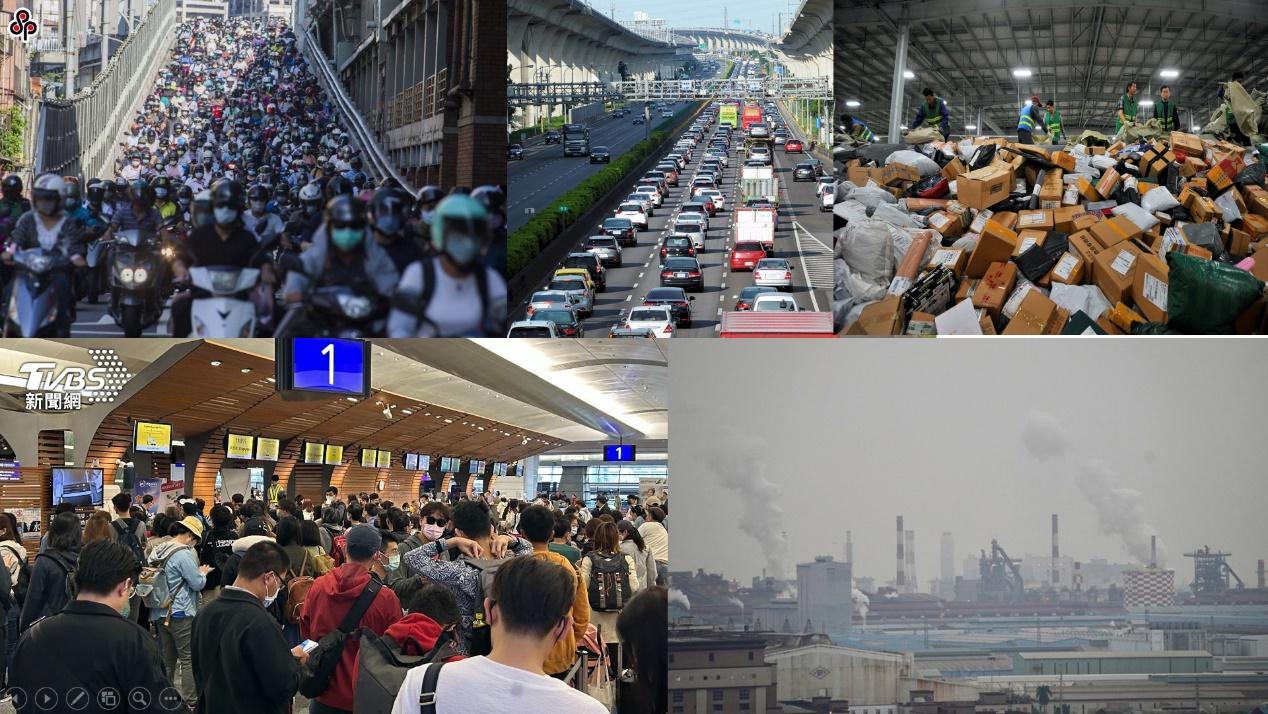 (Photo collage made by the author)
(Photo collage made by the author)
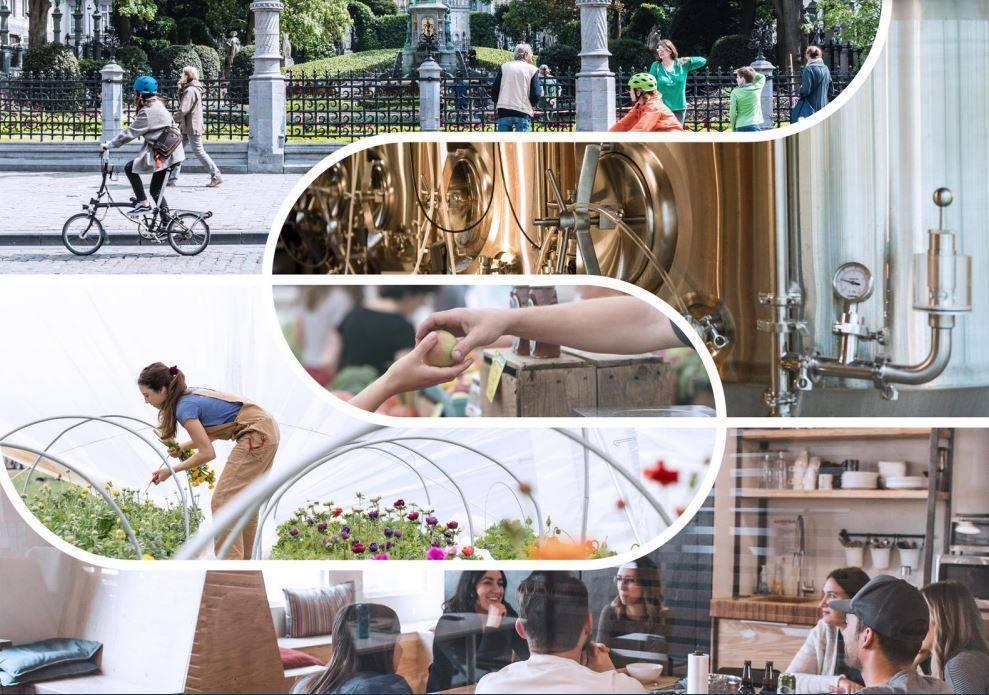 (Source: shiftingeconomy.brussels)
(Source: shiftingeconomy.brussels)
Now let’s see how Taiwan citizens are affected by the so-called “Carbon Anxiety” the majority of European climate-conscious citizens experience today.
If we simply look at their over-reliance on fossil-fuel vehicles, Taiwanese don’t seem to care much about decreasing their carbon footprints in their everyday behavior.
As far as the high-carbon-emission logistics sector, neither the industry nor the consumers seem to be interested in lowering their daily consumption of carbon-intensive e-commerce or goods shipping practices, resulting in intensive greenhouse gas emission in Taiwan’s goods transports and also logistics-related waste generation.
And despite years of efforts boasting its plastic recycling capacities, the generation of waste of all sorts (recyclable or not) has been record-breaking highs exceeding 10 million tons annually over the past two years.
How is Brussels doing
Let’s now take a comparative look at how Belgium, and particularly Brussels, the capital city of the European Union, has done against climate change this past year.
In May, Euronews reported that “Belgium’s solar and wind energy reached a record 29% of electricity generation in the country”. The Brussels Times reported that for the first quarter of 2023, nearly four out of ten of newly-registered vehicles in Belgium are electrical vehicles. And starting from July 2024, all Belgium’s federal ministries will only be allowed to buy or lease purely electrical official vehicles.
As far as cycling is concerned, according to the “Brussels Bike Count” twitter account, more than 1.3 million bike trips occurred for the month of June 2023, that’s 17% increase from last year: never have there been more cyclists in Brussels! Apparently, the social distancing provoked by Covid has made Brussels people adopt cycling, increasing a massive 64 % the number of cycling commuters in 2020.
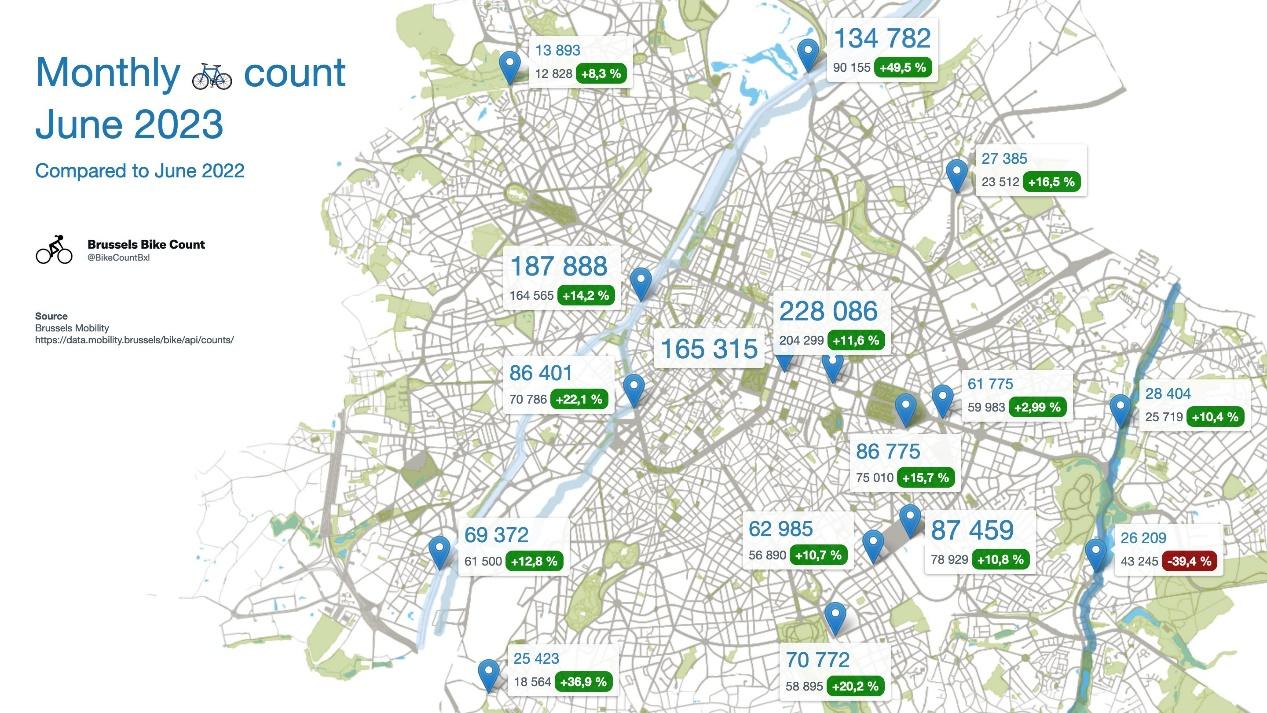 (Source: Brussels Bike Count twitter, July 2nd 2023.)
(Source: Brussels Bike Count twitter, July 2nd 2023.)
In April 2023, the Brussels environmental agency Brussel Leefmilieu/Bruxelles Environnement, published its annual report for 2022, and proudly announced how the Brussels Capital Region priority policy called the “Shifting Economy” (transiting towards a more sustainable economy) has drastically changed the city.
The report cites 13 different figures that prove the major shifts among the 1.2 million inhabitants, or bruxellois. Its 7 city parks have boosted higher attendance due to public promotion campaigns; 20 of its public schools have experienced major “re-vegetation” renovations with over 42,000 square meters of more botanical school surface; 392 urban farm sites have been declared, showing an impressive growth of 30% in the past 5 years; 6 priority subsidized economic sectors meant to support the city to transit to a more sustainable economy have been deployed, such as Good Food, Zero-Waste, Construction (passive and low energy consumption buildings), cultural and creative industries, Good Move (greener mobility).
In the Health sector; there were 2045 “Bruxell’Air” grants to Brussels households who choose to give up their cars for greener commuting modes; and a list of healthy indicators on the “state of the environment in the city”, including over 2,000 commuting cyclists since 2000, 40% more solar energy produced within the city region, 50% less vehicles circulating in the city surveyed during the first Covid lockdown (march 2021), 48% less of PM10 (fine particles in the air) since 2005, and overall, -33% of greenhouse gas emissions since 2004.
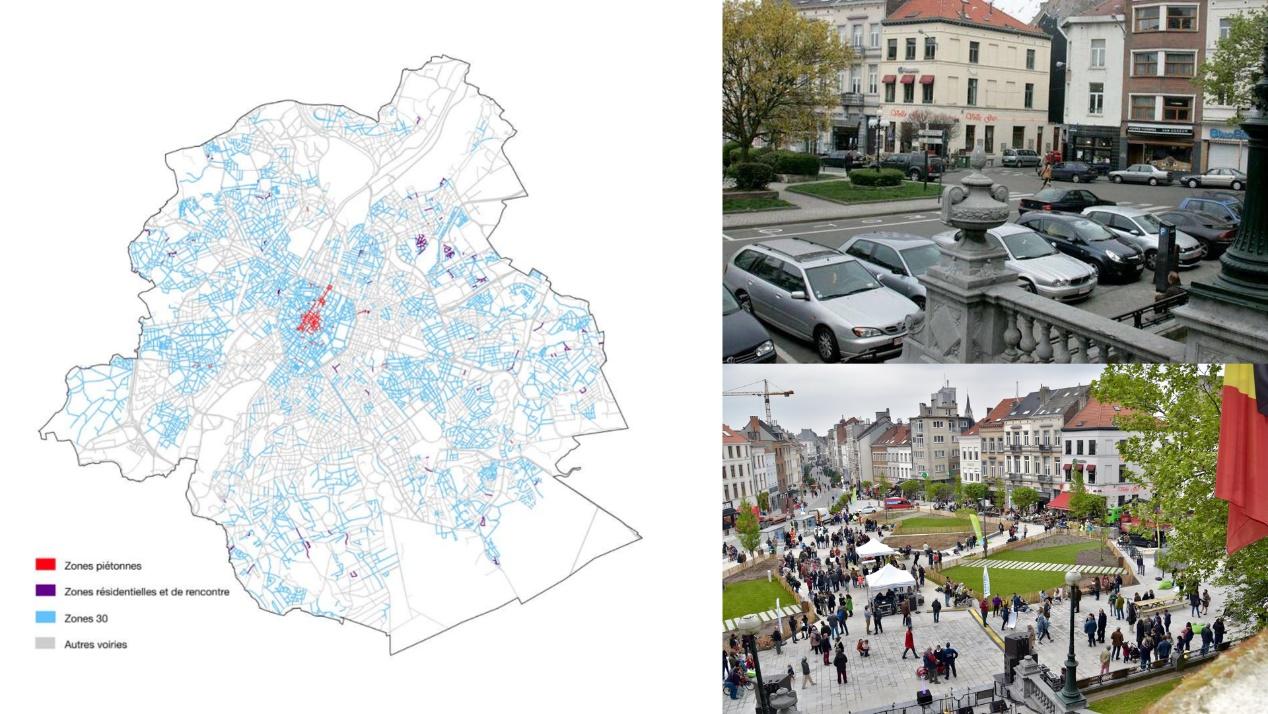 Brussels large-scale “Good Move” urban planning has made since 2019 the city less car-fluid and more people-centered. Photos collected by the author on the web
Brussels large-scale “Good Move” urban planning has made since 2019 the city less car-fluid and more people-centered. Photos collected by the author on the web
Since 1998, cyclists have organised the “Critical Mass Brussels” ride every first Friday of the month starting 6pm (when the city’s car traffic is at its peak) with hundreds of cyclists riding together on the major avenues of the city and cause large traffic jams to raise awareness of both urban pollution caused by cars and calling for more cycling paths in the city.
As a result, since 2019, Brussels has added over 40 kilometers of cycling paths, blocking streets and boulevards to create over 50 hectares of pedestrian zones (the largest in Europe), and enforcing (with heavy fines) large number of low-emission zones across the city (30 km/h zone and no diesel cars are allowed in the city), as part of its comprehensive “Good Move” plan.
In its 2018-2024 mandate, the City of Brussels has successfully kicked off its zero-waste project, by promoting zero-waste stores (where consumers bring their own containers to buy zero-packaging food products), by setting up borrowing schemes for household equipment (cleaning equipment, DIY tools, travel equipment..etc), and by opening a large recycling and “barter” center in the downtown Marolles district to promote exchange of used items between Brussels inhabitants!
One of the most impressive initiatives is the Cairgo Bike Project as part of the Good Move program: citizens and businesses receive a 400 EUR subsidy to purchase a cargo bike for all their urban logistics and transport, in order to reduce van transportations and improve air quality.
August 2nd was recently declared Earth Overshoot Day by the Global Footprint Network of our planet this year. It’s the day of the year where we’ve used up all the resources our planet can produce for humans.
Climate change is really not only the business of advanced countries like the EU, Scandinavia or California. As an island with its scarcity of resources and an incredible indigenous biodiversity, Taiwan should really start acting against climate change, not just continue its green-washing campaigns that actually generate more carbon emissions.
(This piece reflects the author's opinion, and does not represent the opinion of CommonWealth Magazine.)
About the author:

Philippe Tzou heads the Wallonia Export-Investment Agency in Taipei, as part of the Belgian Office in Taipei promoting Belgian trade and investment interests in Taiwan. He is also a tech-savvy mentor for young entrepreneurs, an active Rotarian at a local chapter in New Taipei, and a strong believer that “it’s never too late” as far as fighting climate change, despite the constant carbon anxiety he experiences. The views expressed here reflects only his personal opinion.
Have you read?
- Upgrading Taiwan's children to more international awareness
- Why are wind farm developers leaving Taiwan?
- Taiwan offshore wind development faces headwinds
Uploaded by Ian Huang






